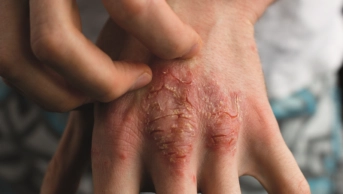
Shutterstock.com
Taking vitamin B12 supplements affects the genes expressed by bacteria living on our skin, report researchers at the University of California, Los Angeles (UCLA) in Science Translational Medicine
[1]
on 24 June 2015.
The pattern of gene expression — the transcriptome — was altered in ten out of ten healthy subjects studied, and triggered the development of acne in one subject.
The different species of bacteria — known as the microbiota — that live on our skin are important to human physiology, in both skin health and disease. “It is important to understand the role of skin bacteria, not only what types of microbes there are, but also what they do,” says Huiying Li, principal investigator in the department of molecular and medical pharmacology at UCLA.
It is not known what proportion of people with acne are sensitive to vitamin B12, and this study does not answer that, nor whether those people should limit B12 intake. Acne was used as a disease model in order to look at the molecular response of the skin microbiota to host metabolite signalling in disease pathogenesis. Subjects were given vitamin B12 supplements by intramuscular injection, as has been described in previous studies, which probably does not reflect levels one might achieve naturally.
By comparing the gene expression profiles of the skin microbiota in acne patients with the profiles from healthy individuals, the vitamin B12 biosynthesis pathway in the skin bacterium Propionibacterium acnes turned out to be significantly down-regulated in acne patients. P. acnes lives in skin follicles and pores and is linked to acne.
Li’s team also grew P. acnes cultures and found that vitamin B12 supplementation promoted the production of porphyrins, which have been shown to induce inflammation in acne. The findings suggest a new bacterial pathogenesis pathway in acne and provide one molecular explanation for a long-standing clinical observation that vitamin B12 supplementation leads to acne development in a subset of individuals.
“It is too early to suggest a clinical implication from our study in terms of B12 supplements,” says Li. “It is not clear if the regular intake of vitamin B12 from food can lead to acne breakout.”
What is important, she says, is that the changes in bacterial gene expression may not be limited to B12-associated acne. “Understanding these changes will help us further investigate the molecular mechanism of acne pathogenesis and identify potential new drug targets for acne treatment,” Li says.
It is unlikely that acne could ever be solely caused by increased levels of vitamin B12, says Anne Eady, a skin microbiologist with a lifelong interest in the pathogenesis and treatment of acne. “How is it that most follicles in acne patients remain normal looking and some people have acne only on the face and others on the face and trunk?” asks Eady, now semi-retired but working as a research fellow at Harrogate and District NHS Foundation Trust. “Why do the lesions develop and then heal rather than persist indefinitely if high serum vitamin B12 caused them to form?”
While it is interesting that one in ten healthy subjects injected with high dose vitamin B12 developed acne, adds Eady, it is more significant that nine out of ten did not.
Eady urges patients not to cut out dietary vitamin B12 in an effort to improve acne. “Whilst there are published reports showing levels above normal can cause acne, there are no data I’m aware of to show whether or not there might be a subset of patients in whom normal serum levels can trigger acne or an acne-like rash,” she says. “There is clearly no simple relationship between blood levels of the vitamin and acne.”


